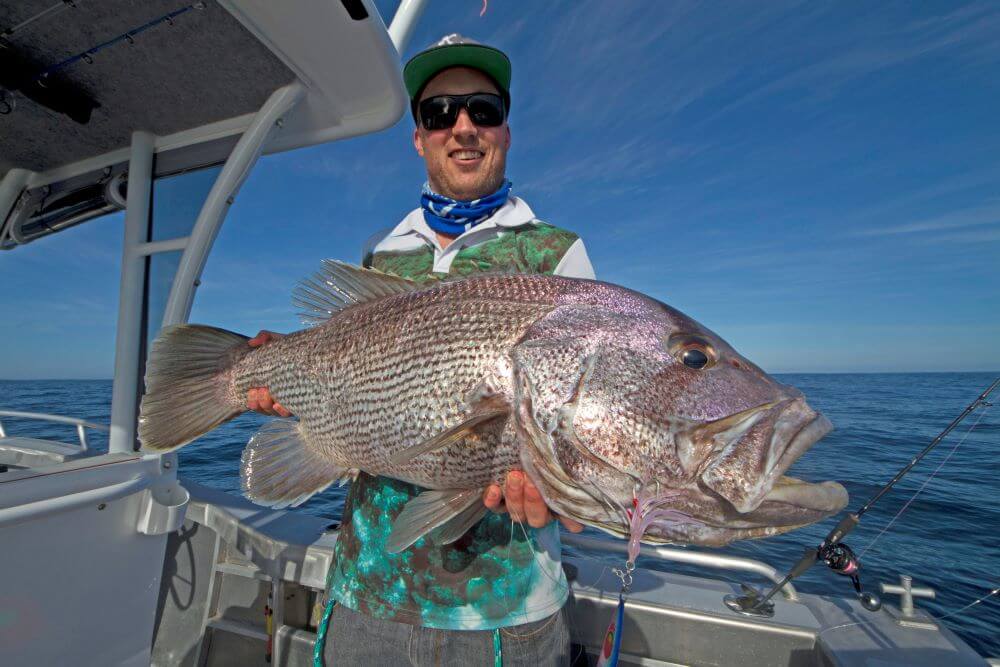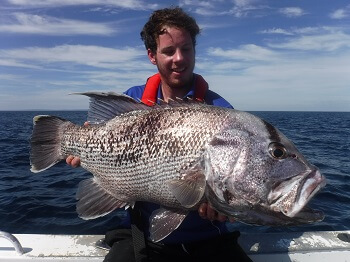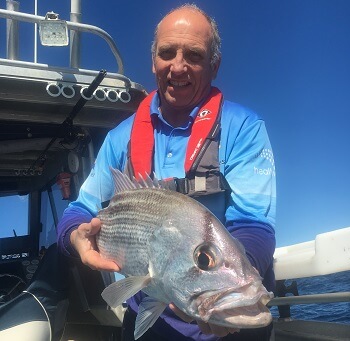The west coast demersal closure ends today with dhuies, pinkies and baldies all back on the Chrissie lunch menu from tomorrow, 16 December.
Continue reading “Doing your bit to help with the recovery of West Coast demersal stocks”
Recfishwest
The west coast demersal closure ends today with dhuies, pinkies and baldies all back on the Chrissie lunch menu from tomorrow, 16 December.
Continue reading “Doing your bit to help with the recovery of West Coast demersal stocks”
Recfishwest recently asked west coast demersal recfishers to participate in a survey regarding the fishery’s future. Continue reading “West coast demersal survey response shows recfishers care passionately about the fishery’s future”
In a positive development relating around the management of dhufish and pink snapper in the West Coast Bioregion, the Department of Primary Industry and Regional Development (DPIRD) has set up a working group to develop a west coast demersal scalefish fishery harvest strategy.
Last December, DPIRD released the latest research on the status of west coast demersal scalefish stocks at the 10-year mark of the recovery plan.

The report noted there were good signs of recovery for this important and popular fishery, especially in the South West. However, the document also reported that there were some areas that were showing evidence of only limited recovery. The next full stock assessment is due, Recfishwest has been told by DPIRD, in late 2020.
The harvest strategy group is made up of eight representatives including one from Recfishwest and others from the recreational, commercial and charter sectors, as well as DPIRD.
“The harvest strategy will contain clearly defined management actions linked to the recovery of our favourite fish and should give us all confidence that dhuies and snapper, which are community owned resources, are being effectively managed to achieve agreed objectives,” said Recfishwest CEO Andrew Rowland.
To find out more about the working group click here
To help Recfishwest represent your interests on the working group and develop the best harvest strategy possible, Recfishwest is encouraging recfishers to outline their views through the west coast demersal scalefish fishery survey.
CLICK HERE TO CARRY OUT THE SURVEY ON THE FUTURE OF THE FISHERY

“It should only take you a few minutes to fill in and by responding you will be having a say in the future of this great fishery,” Dr Rowland said.
“We’ve been asking the Department for a harvest strategy for some time now for this fishery as it clearly sets out a framework and roadmap for fisheries management decisions with clear objectives, assessments, trigger points and decision rules.”
Dr Rowland said it was important to note that a harvest strategy does not deal with specific fishing rules such as bag and size limits, but rather sets broad scale biological, economic and social objectives around how the fishery should be managed.
“We strongly believe in fisheries management transparency and, rest assured, we will be reporting back to you on each meeting of the working group and will share with you the draft harvest strategy for further comments and input,” he said.
“We want to ensure future generations of West Aussie fishers can continue to enjoy catching dhuies and pinkies. So, we’ll be doing everything in our power to make sure this special fishery continues to provide great fishing experiences, forever.”
To learn more about what a harvest strategy is check out this video from Fisheries Queensland
A decision to donate multiple dhuie and pink snapper frames to the latest West Coast demersal scalefish stock assessment has booked Lisa Woolfenden on a six-day charter to the Montebello Islands – and she’s amped! Continue reading “Send Us Your Skeletons winner set for fishing trip of a lifetime to the magnificent Montebellos”
The West Coast demersal fishing closure begins on 15 October and ends on 15 December to give high-value species like dhuies, pinkies and baldies a break from fishing pressure to help with their ongoing recovery. Continue reading “One fishing door closes temporarily, a heap of fishing alternatives open!”
There’s plenty of misconception in the fishing community around the management of our favourite demersal species in the West Coast Bioregion. Continue reading “What the demersal closure means for your fishing”
Following any shark attack, there is inevitably an ill-informed call for the reintroduction of commercial gillnets between Lancelin and Mandurah under the guise of improving public safety. Continue reading “Premier’s Position on Metro Gillnetting Spot On”
The iconic Dhufish remains a favourite species for West Aussie fishers, as tens of thousands of us hit the water each summer in an attempt to snare one of these magnificent fish. Despite their popularity, concerns have been raised for the sustainability of Dhufish stocks and strict regulations on bag and boat limits have been in place alongside the annual demersal closure to protect recovering stocks.
In the September issue Recfishwest’s Broad Cast, we brought you an update on Recfishwest’s request, on the back of multiple requests from the community, for a review of the boat limit on Dhufish which currently sits at two.
 Given the slow growth of this iconic fish, this is not a decision we took lightly, but was prompted after recent anecdotal reports from fishers indicating that the resource was recovering well, including a high abundance of juvenile fish not seen for many years. Current recreational catches are well below the sustainability target level set for an adequate recovery, in fact recreational take had reduced by 62% since 2009 when management was introduced to reduce the catch by half.
Given the slow growth of this iconic fish, this is not a decision we took lightly, but was prompted after recent anecdotal reports from fishers indicating that the resource was recovering well, including a high abundance of juvenile fish not seen for many years. Current recreational catches are well below the sustainability target level set for an adequate recovery, in fact recreational take had reduced by 62% since 2009 when management was introduced to reduce the catch by half.
We were pleased to report in September that the Department of Fisheries had agreed to review our request once the most recent stock assessment information was available. Unfortunately the full stock assessment for Dhufish has been delayed, and is now expected to be available in mid-2017, however a preliminary assessment of WA Dhufish was undertaken to assist in evaluating potential changes to the boat limit.
In late November, preliminary information from the stock assessment was available and although Recfishwest’s calculations indicated the recreational take will remain below the sustainability target with an increased boat limit to three Dhufish, the assessment indicated that the stock may be recovering more slowly than expected in the northern and metropolitan areas of the West Coast Bioregion.
The Department of Fisheries made the decision that the rate of recovery was not sufficient enough to allow an increase in the boat limit at this time. This news will be disappointing to some fishers, however, in the face of current uncertainties, Recfishwest does not support a change to rules that may put the recovery of this iconic species at risk. It is important to understand that Recfishwest will only support management changes when there is clear evidence of sufficient Dhufish stock recovery, and with confidence that any changes will not compromise future sustainability.
Additional analysis of the status of WA Dhufish will be completed as part of the full assessment of West Coast demersal scalefish due to be delivered in mid- 2017. This full assessment will include more complex stock assessment analysis than what was possible at the time of the preliminary assessment and will further inform any potential management changes.
The full assessment will also include the results of the third iSurvey due for release later this year and a more detailed examination of the potential impacts of any management changes. Recfishwest’s request will be revisited when the full assessment is available.
The iconic Dhufish story has many twists and turns, particularly in the last decade, but we have come too far to increase the risk to these fish in any way. The stock assessment indicates that current fishing levels are allowing the stock to recover.Ongoing anecdotal reports of high abundances of juvenile fish, particularly in the metro area, are encouraging. The long term forecast indicates sunny skies for Dhuies.
There’s no more iconic fish in West Australia than a Dhufish. This fishing favourite has long been a part of West Australian culture as far back as can be remembered and in 2009 when sustainability concerns were first raised, WA fishos graciously accepted the introduction of a Dhufish boat limit, reduced bag limit and a two month closure in the West Coast Bioregion as part of efforts to reduce catches by 5o%.
At the time it was unknown if these management changes would be enough to reduce catches by 50% which was the amount deemed necessary by researchers in order to adequately protect Dhufish stocks and allow this favourite fish to recover. Since the boat limit and other management changes were introduced, catches of Dhuies have remained stable and have exceeded the sustainability target by reducing our catch by 62%. This indicates the initial 2009 management arrangements may have been set a little too high. On that basis and combined with the overwhelming community view that the boat limit of two Dhufish is inequitable for those fishing in larger groups, Recfishwest believes there is scope to increase the Dhufish boat limit in line with Dhufish recovery and the sustainability targets that have been set by Department of Fisheries researchers.
It took a few years, but in 2013 the Dhufish stocks were showing the first signs of recovery and fishers were seeing lots of smaller Dhufish indicating increased recruitment in the fishery. Fishers are pleased to see tangible results from their efforts to reduce catches. Many fishers have actively promoted the positive effects on fish stocks these management changes have had, demonstrating the high level of stewardship for this resource.
A stock assessment in 2013 confirmed some recovery of Dhufish stocks and following this report Recfishwest requested the Department of Fisheries investigate what effect increasing the boat limit would have on Dhufish stocks and target catch levels. The Department decided not to review the boat limit for Dhufish at the time, preferring to obtain more data on Dhufish from the boat ramp surveys and future stock assessments.
A study of recreational boat fishing catches released in 2015 provided Recfishwest with the confidence that our original request in 2013 was sustainable and that a change to the boat limit would not negatively impact Dhufish stocks. Once again we sought a commitment from the Department of Fisheries to investigate the effect of changes to the boat limit of Dhufish. The Department of Fisheries once again preferred to await more information.
Recfishwest is proud to announce the Department of Fisheries has now agreed to review Recfishwest’s request when information from the latest stock assessment for Dhufish becomes available later this year.
Of course, any decisions must be based on sound science using the best information available with sustainability at the forefront. Recfishwest are comfortable that an increase in the boat limit of Dhufish would still see our sectors catch remain below the level needed to ensure the continued recovery of this iconic species. This change, however, would greatly improve fishing experiences on those rare times when there are more than two fishers on board and you are all lucky enough to hook onto a Dhufish.
Recfishwest believes any increase in the number of Dhufish retained as a result of increases to the Dhufish Boat limit will have a minimum biological impact on stocks and provide a major positive impact on recreational fishing amenity. Any increase in catches will remain below the level required to ensure the sustainable recovery of Dhufish.
It’s important to remember that not all of us are lucky enough to catch multiple Dhufish every time we go fishing, but for this special occasion, we believe a group of three should each be able to take a Dhufish home to their family.
We are confident the next stock assessment will reflect the recovery that fishos have been seeing since 2013 and are hopeful management arrangements can be amended to allow an increase in the boat limit of Dhufish before the end of the West Coast Demersal Closure on December 15 this year allowing more West Aussies to enjoy a Dhufish for Christmas!
Demersal on the Menu in time for Christmas
Prized Dhufish, Pink Snapper and Baldchin Groper will be the catch of the day for Christmas with anglers in the West Coast Bioregion once again allowed to fish for demersal scalefish.
In another positive for recreational fishers and demersal fish stocks, the closures over the past six years are proving successful going on the catches from earlier this year.
Recfishwest Chief Executive Officer Dr Andrew Rowland said the two-month closure on catching demersal scalefish (from October 15 to December 15) in the West Coast zone introduced in 2009, has been effective.
“The goal of achieving a 50 per cent reduction in catch numbers since management changes were introduced has been reached, and we’ve made great strides toward allowing stocks to recover, and ensuring sustainability of this fishery,” he said.
“This will have great flow on effects and it is a credit to responsible WA fishers that the recreational sector was able to meet the targets set by fisheries managers.
“If these fish stocks continue to show the same level of recovery, the easing of management controls on demersal fish species in the West Coast could be on the cards in the future.
The closure lifting does not include Cockburn and Warnbro Sounds, which remain closed to fishing for pink snapper until the 31 January. Dr Rowland said the additional closed areas are critical to spawning.
Recfishwest advocates for sustainable fishing resources and policies that ensure long term benefits to all recreational fishers.
For more information about Recfishwest visit www.recfishwest.org.au or phone Recfishwest on 9246 3366.